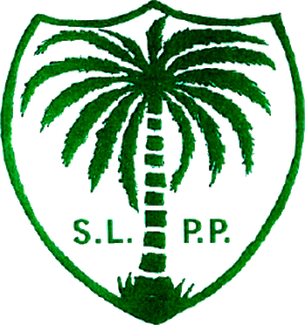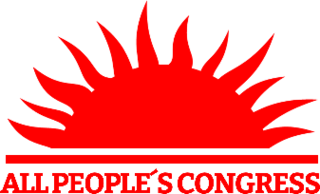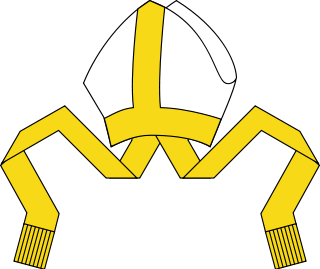| |||||
| Decades: | |||||
|---|---|---|---|---|---|
| See also: | |||||
Events in the year 2024 in Sierra Leone .
| |||||
| Decades: | |||||
|---|---|---|---|---|---|
| See also: | |||||
Events in the year 2024 in Sierra Leone .
Source: [9]

Sierra Leone, officially the Republic of Sierra Leone, is a country on the southwest coast of West Africa. It is bordered to the southeast by Liberia and by Guinea to the north. Its land area is 71,740 km2 (27,699 sq mi). It has a tropical climate and environments ranging from savannas to rainforests. As of the 2023 census, Sierra Leone has a population of 8,908,040. Freetown is both its capital and its largest city. The country is divided into five administrative regions, which are further subdivided into 16 districts.
Sierra Leone first became inhabited by indigenous African peoples at least 2,500 years ago. The Limba were the first tribe known to inhabit Sierra Leone. The dense tropical rainforest partially isolated the region from other West African cultures, and it became a refuge for peoples escaping violence and jihads. Sierra Leone was named by Portuguese explorer Pedro de Sintra, who mapped the region in 1462. The Freetown estuary provided a good natural harbour for ships to shelter and replenish drinking water, and gained more international attention as coastal and trans-Atlantic trade supplanted trans-Saharan trade.

The Sierra Leone People's Party (SLPP) is one of the two major political parties in Sierra Leone, along with its main political rival the All People's Congress (APC). It has been the ruling party in Sierra Leone since 4 April 2018. The SLPP dominated Sierra Leone's politics from its foundation in 1951 to 1967, when it lost the 1967 parliamentary election to the APC, led by Siaka Stevens. Originally a centre-right, conservative party, it identifies since 2012 as a centre-left social democratic party, with a centrist tendency.

The All People's Congress (APC) is one of the two major political parties in Sierra Leone, the other being its main political rival the Sierra Leone People's Party (SLPP). The APC has been the main opposition party in Sierra Leone since 4 April 2018 when Julius Maada Bio of the SLPP won the 2018 presidential elections, though it maintains a majority in parliament.

Julius Maada Wonie Bio is a Sierra Leonean politician who has served as president of Sierra Leone since 4 April 2018. He is a retired brigadier in the Sierra Leone Army and was the military head of state of Sierra Leone from 16 January 1996 to 29 March 1996, in a military junta government known as the National Provisional Ruling Council (NPRC). Bio is the first democratically elected president of Sierra Leone born after Sierra Leone's independence from British colonial rule.
Solomon Ekuma Dominic Berewa was Vice-president of Sierra Leone from May 2002 to September 2007. Standing as the candidate of the Sierra Leone People's Party (SLPP), he was defeated in the second round of the 2007 presidential election by Ernest Bai Koroma of the All People's Congress (APC).

Ernest Bai Koroma is a Sierra Leonean politician who served as the fourth President of Sierra Leone from 17 September 2007 to 4 April 2018.

General elections were held in Sierra Leone on 17 November 2012. The result was a sweeping victory for the ruling All People's Congress. Its leader, incumbent president Ernest Bai Koroma, won 58.7% of the vote, enough to win a second term without the need for a runoff. The APC also won 67 of the 112 elected seats in Parliament. To date, it is the APC's best showing at an election since the restoration of multiparty politics in 1991.

Dr Samura Mathew Wilson Kamara is a Sierra Leonean politician and economist. He was the All Peoples Congress (APC) Party's candidate for President of Sierra Leone in the 2018 election and 2023 election. He was the Minister of Foreign Affairs and International Cooperation of Sierra Leone from 2012 to 2017, Minister of Finance and Economic Development from 2009 to 2013, Governor of the Bank of Sierra Leone from 2007 to 2009, Financial Secretary in the Ministry of Finance during President Ahmad Tejan Kabbah's administration.

Alhaji Usman Boie Kamara is a Sierra Leonean politician, businessman and mining engineer who has been Minister of Trade and Industry of Sierra Leone since 2013. He previously worked as director of the Sierra Leone National Diamond Mining Company (NDMC).
Kaifala Marah is a Sierra Leonean politician, accountant, Governor of the Bank of Sierra Leone (2016–2017), and Minister of Finance (2013–2016). On 7 March 2017, Dr. Marah resigned as governor to seek the nomination of the All People's Congress (APC) for the presidential election of 2018.

India–Sierra Leone relations refers to the international relations that exist between India and Sierra Leone. India maintains a High Commission in Freetown. Sierra Leone does not have a resident diplomatic mission in India. The Sierra Leonean embassy in Abu Dhabi, United Arab Emirates is accredited to India.

General elections were held in Sierra Leone on 7 March 2018 to elect the President, Parliament and local councils. Incumbent President Ernest Bai Koroma did not run for another term, as he was constitutionally ineligible, having served the maximum ten years in office.
Events in the year 2018 in Sierra Leone.

Patrick Daniel Koroma, C.S.Sp., MOR was the bishop of the Catholic Church in Kenema, Sierra Leone.

Fatima Maada Bio, known simply as Fatima Bio, is a Sierra Leonean former actress, screenwriter and film producer who has served in the role of first lady of Sierra Leone, as the wife of President Julius Maada Bio since 2018.
James Bambay Kamara served as Inspector General of the Sierra Leone Police Force from 1987 until 1992.
The Lungi Bridge Project is a proposed major infrastructure project in the West African country of Sierra Leone. The 7km long bridge will link the Lungi area to Freetown, passing over the estuary of the Sierra Leone River.
Capital punishment has been abolished in Sierra Leone. Sierra Leone abolished capital punishment in July 2021 following a decision by the nation's Parliament.

On 26 November 2023, a group of militants attacked several locations in Freetown, the capital of Sierra Leone. The country was subsequently placed under a nationwide curfew, with a manhunt being called to find the militants. President Julius Maada Bio claimed the attack was repelled by the security forces and said the government was in control of the situation. The attacks were described by international organizations as attempts to disrupt constitutional order in the country, and by information minister Chernor Bah as an "attempted coup".